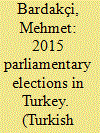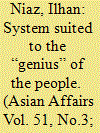| Srl | Item |
| 1 |
ID:
145637


|
|
|
|
|
| Summary/Abstract |
Turkey held two consecutive parliamentary elections in an interval of five months that produced entirely different results. The June 7 elections saw the Adalet ve Kalkınma Partisi (AKP) lose its parliamentary majority and the rise of the Halkların Demokratik Partisi (HDP) as a game-changer. Following the collapse of coalition talks, the subsequent snap elections held on November 1, 2015 took place under a dramatically different context, being marked with issues of security and stability that trumped the issues that were decisive in the June 7 elections, such as the economic slowdown, growing authoritarianism, and allegations of corruption. The electorate's search for a stable and strong government, the AKP's adjustments in an apparent response to the criticisms of the electorate, and the mistakes made by opposition parties gave the AKP the opportunity once again to form a single-party government after the November 1 elections.
|
|
|
|
|
|
|
|
|
|
|
|
|
|
|
|
| 2 |
ID:
125203


|
|
|
|
|
| Publication |
2013.
|
| Summary/Abstract |
A great nation, a great power"-the recent Fourth General Congress of Turkish Prime Minister Recep Tayyip Erdogan's AKP party proclaimed this ambitious goal for 2023, the hundredth anniversary of the founding of the Turkish Republic. The Congress celebrated Erdogan's leadership and reelected him as party chairman. With his party's backing, and through a prospective new constitution that will create a powerful "presidential system," Erdogan expects to preside over the anniversary celebrations as president of a transformed Turkey that dominates the Middle East.
|
|
|
|
|
|
|
|
|
|
|
|
|
|
|
|
| 3 |
ID:
166149


|
|
|
|
|
| Summary/Abstract |
How do the president's calculations in achieving policy goals shape the allocation of cabinet portfolios? Despite the growing literature on presidential cabinet appointments, this question has barely been addressed. I argue that cabinet appointments are strongly affected not only by presidential incentives to effectively deliver their key policy commitments but also by their interest in having their administration maintain strong political leverage. Through an analysis of portfolio allocations in South Korea after democratization, I demonstrate that the posts wherein ministers can influence the government's overall reputation typically go to nonpartisan professionals ideologically aligned with presidents, while the posts wherein ministers can exert legislators' influence generally go to senior copartisans. My findings highlight a critical difference in presidential portfolio allocation from parliamentary democracies, where key posts tend to be reserved for senior parliamentarians from the ruling party.
|
|
|
|
|
|
|
|
|
|
|
|
|
|
|
|
| 4 |
ID:
175071


|
|
|
|
|
| Summary/Abstract |
In recent months there has been an effort to reignite debate about the suitability of a federal parliamentary system and argue that it needs to be replaced by a centralized presidential form of government. This has led to sharp reactions from those who favour a continuation of parliamentary government in Pakistan especially with regard to the strong federal provisions of the Eighteenth Amendment (2010) to the Pakistani Constitution, which granted greater autonomy to the provinces and undid many of the changes imposed by military rulers. This paper examines the original version of this debate from Pakistan's experience in the 1950s and 1960s with the aim of identifying and discussing the rationales of those in favor of a presidential Pakistan and the price that the country paid for undermining parliamentary government.
|
|
|
|
|
|
|
|
|
|
|
|
|
|
|
|